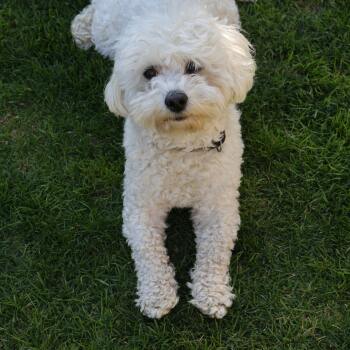Bichon Frise

A Fluffy Package of Personality
If you're lucky enough to share your life with a Bichon Frise—or you’re considering bringing one home—get ready for nonstop entertainment! These cheerful, cloud-like pups are packed with charm, joy, and just the right amount of sass. From comedy routines in the living room to cuddle sessions on the couch, life with a Bichon is never dull.
Why Bichons Win Over Everyone They Meet
- Little Performers: Silly, playful, and full of antics, they’ll have your whole household laughing.
- Endlessly Curious: Always poking their nose into the next fun adventure.
- People-Lovers: They thrive on attention and adore being around their humans.
- Always Exploring: Whether indoors or out, Bichons are energetic and ready for anything.
- Social Superstars: Friendly with kids, pets, and strangers alike.
- Family Favorites: Loyal, affectionate, and perfectly sized for snuggles.
Quirks to Be Aware Of
- Housetraining Takes Time: Patience and consistency go a long way.
- Sensitive Souls: Anxiety can sometimes lead to snapping or overreacting.
- Loves the Spotlight: Bichons want to be front and center—always.
- Not Fans of Alone Time: Separation anxiety is common, so plan for company.
- Grooming Demands: That beautiful coat needs regular brushing and professional grooming.
- Chattier Than Most: Expect some barking—especially when they’re excited!
A Royal History (with a Circus Twist!)
Bichons originally sailed from the Mediterranean and quickly charmed their way into royal courts in France and Italy. Known for their intelligence and trainability, they later became beloved circus performers. Whether in a palace or your living room, they’ve always known how to steal the show!
Living Long and Loving Hard
With a typical lifespan of 14–16 years, Bichons are relatively hardy little dogs. That said, they are prone to some breed-specific conditions—early detection and regular vet visits are key to a happy, healthy life.
Health Highlights for Bichon Frises
- Heart Conditions
-
Heart Murmurs & Valve Disease— Regular checkups can catch signs early, and medications can help manage symptoms as they age.
-
Patent Ductus Arteriosus (PDA)— A congenital heart issue that may require surgical correction—but is often detectable via stethoscope in early exams.
-
-
Liver Shunt (Portosystemic Shunt)— This disorder limits blood flow through the liver, affecting toxin removal and growth. If your Bichon experiences poor growth, seizures, or behavioral changes, testing is needed. Treatment may involve surgery or lifelong dietary management.
-
Cataracts & Glaucoma
-
Cataracts— Cloudy lenses can lead to vision loss but are often manageable or treatable with surgery.
-
Glaucoma— A painful condition requiring urgent care—look out for squinting, red eyes, or excess tearing.
-
- Autoimmune Blood Disorders— Rare but serious conditions like Hemolytic Anemia and Thrombocytopenia can cause fatigue, bleeding, or bruising. Quick intervention with medications, including steroids, is critical.
- Patellar Luxation (Slipping Kneecap)— If your Bichon skips or limps on one leg, their kneecap may be shifting out of place. Mild cases often need only medication, while severe ones may require surgery.
- Bladder & Kidney Stones— Bichons are prone to urinary crystals and stones. If they’re straining to urinate or have blood in their urine, call your vet immediately. Prescription diets and hydration help prevent recurrence.
- Skin Allergies (Atopy)— Frequent paw licking, face rubbing, or ear infections could point to environmental allergies. Fortunately, a mix of medications, diet changes, and topical care can provide relief.
- Diabetes— Bichons are more likely to develop diabetes, particularly in later years. Symptoms include increased thirst, hunger, and weight loss. With insulin therapy and diet, diabetic dogs can live long, healthy lives.
- Hemangiosarcoma— This aggressive bleeding tumor often forms silently in organs like the spleen. Routine wellness exams and ultrasounds for seniors can help detect this condition early.
- Epilepsy— Seizures can be caused by many underlying issues, including genetic epilepsy. If your Bichon has a seizure, focus on their safety and contact your vet. Lifelong medication may be needed.
- Hip & Elbow Dysplasia— Though more common in large breeds, dysplasia can also affect Bichons. Limping or stiffness may be early signs. X-rays, weight management, and medications can improve mobility and comfort.
- Legg-Calve-Perthes Disease— This hip joint condition in young dogs causes sudden limping and pain. If caught early, surgery can greatly improve your Bichon’s mobility and quality of life.
- Spinal Issues— Instability between the top two neck vertebrae can lead to serious spinal cord injuries. Signs include yelping, hesitation with stairs, or sudden pain. Ramps and gentle handling can help prevent injuries, especially as your dog ages.
Your Little Cloud Deserves the Best
Have questions or concerns about your Bichon Frise’s health or care? We’re here to help every step of the way.
Ready to Learn More? We’re Here to Help!


